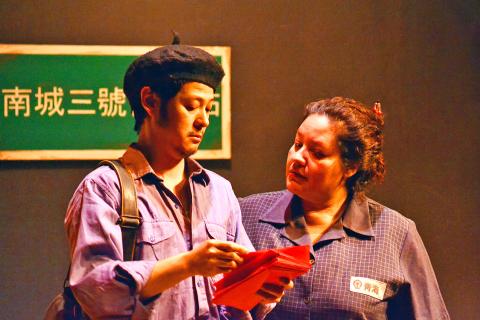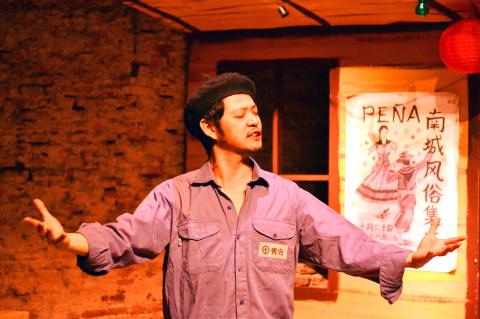The mezzanine at Bar Imperial in Buenos Aires’ Palermo barrio is deserted when Ignacio Huang (黃勝煌) arrives five minutes early.
That’s hardly surprising. Buenos Aires is in snooze mode at this neither-nor time of night. Portenos, as the city’s denizens are known, rarely sup before 10pm, and it’s not uncommon for them to sit down to dinner close to midnight.
Our appointment at 8pm might be considered gauche, but Huang is not concerned with the city’s snooty protocol. The Taiwan-born actor is not your typical porteno. On the back of the 2011 hit comedy-drama Chinese Take-Away (Un Cuento Chino), he attained instant celebrity across Latin America. The movie scooped multiple prizes at Argentina’s showcase award ceremonies, with Huang nominated in three categories, and was the highest-grossing domestically produced film of the year.

Photo courtesy of Ignacio Huang
“My world changed at that moment,” Huang says. “I would walk down the street and people called out and wanted to take pictures with me. I went to Cuba for a film festival and coming out of the theater [after the screening] was the most shocking moment of my life. Everyone was reaching out to me and asking to take pictures. There was” — here he pauses, grasping for the right metaphor — “a rain of flashes.”
The experience, Huang says, was pivotal. “Before that I used to tremble before I went on stage. After, I didn’t tremble anymore.” Here he explodes with the charming, nervous guffaw that punctuates much of his conversation, and shrugs, almost surprised at himself.
Better known by the diminutive Nacho or Nachito to his friends, Ignacio Huang was born Huang Sheng-huang in Taipei. His father was a textile merchant from Hsinchu who moved his family first to Paraguay for two years, then to Argentina, after his business in Taiwan went bankrupt.

Photo courtesy of Ignacio Huang
As with many ex-pat Taiwanese in Latin America, the whiff of a business opportunity was the catalyst for the decision. In the 1970s and 1980s, Paraguay was a surprisingly popular destination, due in part to the Chinese Nationalist Party (KMT) government’s coziness with the staunchly anticommunist regime of dictator Alfredo Stroessnor.
Huang remembers Paraguay’s capital Asuncion as a sleepy place and its citizens as a lethargic but friendly bunch in comparison to portenos. It is noticeable that despite the recurring ambivalence he demonstrates over his identity, Huang here employs the first person plural.
“We are horrible people!” he says, laughing loudly. “We are mean because we are vivaracho,” he says. The term is nuanced, denoting a subtle range of characteristics related to intelligence. Though Huang is alluding to guile and a certain degree of fickleness, the description also carries a sense of whimsy. “We like to speak a lot of lies,” he says. “Cheating and changing our mind very quickly.”
Before falling into acting by chance, Huang graduated from the University of Buenos Aires in 2000 with a degree in graphic design. He worked in that field for a couple of years and would frequently come across stock photos featuring Asian models.
Curious about the possibility of finding work as a model, he searched for the agencies that supplied these photos, but discovered they came from companies in the US. He signed with a modeling agency, but soon found out it was a scam. The experience did, however, include a strut along a catwalk and the chance to ham it up for the camera.
‘BLANK PAPER’
Huang says he felt frustrated and trapped by a career that bored him senseless. A friend mentioned a local studio offering acting classes, and one night after work, Huang made the short trip down the road from his office.
Although Huang didn’t recognize the man who greeted him at the studio, the renowned Argentine stage and screen actor Norman Briski was taken with the raw vulnerability of the young dilettante who had walked through his door.
“Norman was very happy because I was like a blank paper for him,” he says. “But he asked me why I acted like I was being watched all the time, and I started to realize that it was because I did feel like I was being watched at every time and in every place,” Huang says.
Minor roles in TV followed, but he frequently found himself typecast. Chinese masseuse, delivery boy, triad member — these were all he was deemed good for. Then, along came the game-changer. At the audition for Chinese Take-Away, he was asked to provide three reasons for choosing him.
“I almost cried,” he says. “I told him ‘I’m the one that has studied and has real experience compared to the other Chinese guys here. Next, I really know what it is like to lose someone close, like my character in the movie. And the third reason: I’m like a steam train and I want to keep going. If you give me a way, I will run.’”
As the character Jun, a clueless Fujianese immigrant in Buenos Aires, Huang is by turns irritant and emollient to an irascible hardware store owner played by Argentine screen legend Ricardo Darin. Huang’s delicate performance garnered three nominations at the two major Argentine film industry events — the Premios Sur and the Premios Condor de Plata.
INSTITUTIONAL RACISM
Since this pinnacle, Huang has worked steadily without getting the kind of offers he believes are his due. He attributes this in part to institutional racism and corruption. These, he says, were also factors in his failure to win an award for Chinese Take-Away.
The stereotypes continue. “Just today,” he says, “an agency called me and told me they wanted someone to play a waiter. I just told them, ‘Waiter? No,’ and hung up. I did waiter. I’m not doing waiter again.”
Yet, there is an inherent contradiction in Huang’s disdain. He admits to taking recent TV and movie roles for financial motives, roles that he describes as “absurd,” and while he is continuing his studies in scriptwriting, he says he may have to drop out if these offers continue.
Perhaps the most interesting example of Huang’s paradox is that the character of Jun in Chinese Take-Away is unable to speak Spanish. He communicates to an exasperated Roberto through Mandarin, gestures and, most poignantly, images.
The Mandarin is not subtitled in the original version of the film, and while most Argentines know Huang is a native Spanish speaker, elsewhere in Latin America, it has come as a surprise to many. It is a peculiar irony that the outsider status that so irks Huang has only been reinforced by his defining role.
More recently, Huang’s successes have included the self-penned fringe production China Pampa and his first outing on the Calle Corrientes, Argentina’s equivalent of Broadway, in La Maquila. In this latter production, Huang plays an insane immigrant who is exploited at a sweatshop along with other ethnic minorities.
Meanwhile, Huang is putting the finishing touches on a traditional Taiwanese puppet production based on Journey to the West (西遊記). There has also been a return to the big screen with two immigration-themed films that won prizes at the 2014 Buenos Aires International Independent Film Festival.
FOND MEMORIES
Actors spend their working lives pretending to be other people, so Huang’s wrangle with his own identity made his choice to pursue a career as a thespian logical. Searching for his place at the fuzzy boundary of two worlds, his dilemma brings to mind the plight of Hu Tai-ming (胡太明), the eponymous protagonist of Wu Chuo-liu’s (吳濁流) Orphan of Asia (亞細亞孤兒).
For Huang, his situation is a further remove from the historical vicissitudes of Taiwanese consciousness. “I am,” he says, “a no-country man. I have to love Argentina because I have no choice, but I won’t go back to Taiwan. Now I realize neither Taiwan nor Argentina loves me. I’m some no-nation person.”
Having left Taiwan as a 12-year-old, Huang has not yet returned to visit, though he’s hoping to rectify that next year. He retains fond memories of relatives, images and smells of Taipei, though he recalls it as a dreary place, beset by plum rains and typhoons, and with none of the green spaces and roadside flowerbeds that so impressed him on his arrival in Buenos Aires.
From racism and the jealousy of his peers to Argentina’s economic woes, Huang is not short of gripes. However, it’s obvious that his relationship with his father rankles most. The anger that screams silently in his lively eyes is plain as he repeatedly refers to his dad as a “stupid man” who subjected his family to upheaval and heartbreak in the pursuit of harebrained pipe dreams.
WORK IN PROGRESS
Huang’s mother passed away five years ago from an untreated tooth infection, and he pins the blame squarely on his father for dragging her to a remote forest area near Salta in the northwest of the country. There, his father had hoped to set up business exporting timber to China. Like most of his other plans, it failed. “More stupidity,” Huang says bitterly.
In a more recent online correspondence, Huang’s tone softens. “I feel some sadness about him,” he says. “He’s a poor lonely soul.”
Will they patch things up?
Like most things in his life, it is a work in progress, he says.

In the March 9 edition of the Taipei Times a piece by Ninon Godefroy ran with the headine “The quiet, gentle rhythm of Taiwan.” It started with the line “Taiwan is a small, humble place. There is no Eiffel Tower, no pyramids — no singular attraction that draws the world’s attention.” I laughed out loud at that. This was out of no disrespect for the author or the piece, which made some interesting analogies and good points about how both Din Tai Fung’s and Taiwan Semiconductor Manufacturing Co’s (TSMC, 台積電) meticulous attention to detail and quality are not quite up to

April 21 to April 27 Hsieh Er’s (謝娥) political fortunes were rising fast after she got out of jail and joined the Chinese Nationalist Party (KMT) in December 1945. Not only did she hold key positions in various committees, she was elected the only woman on the Taipei City Council and headed to Nanjing in 1946 as the sole Taiwanese female representative to the National Constituent Assembly. With the support of first lady Soong May-ling (宋美齡), she started the Taipei Women’s Association and Taiwan Provincial Women’s Association, where she

Chinese Nationalist Party (KMT) Chairman Eric Chu (朱立倫) hatched a bold plan to charge forward and seize the initiative when he held a protest in front of the Taipei City Prosecutors’ Office. Though risky, because illegal, its success would help tackle at least six problems facing both himself and the KMT. What he did not see coming was Taipei Mayor Chiang Wan-an (將萬安) tripping him up out of the gate. In spite of Chu being the most consequential and successful KMT chairman since the early 2010s — arguably saving the party from financial ruin and restoring its electoral viability —

It is one of the more remarkable facts of Taiwan history that it was never occupied or claimed by any of the numerous kingdoms of southern China — Han or otherwise — that lay just across the water from it. None of their brilliant ministers ever discovered that Taiwan was a “core interest” of the state whose annexation was “inevitable.” As Paul Kua notes in an excellent monograph laying out how the Portuguese gave Taiwan the name “Formosa,” the first Europeans to express an interest in occupying Taiwan were the Spanish. Tonio Andrade in his seminal work, How Taiwan Became Chinese,